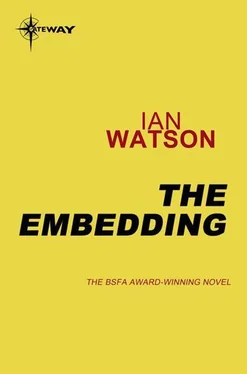Ian Watson - The Embedding
Здесь есть возможность читать онлайн «Ian Watson - The Embedding» весь текст электронной книги совершенно бесплатно (целиком полную версию без сокращений). В некоторых случаях можно слушать аудио, скачать через торрент в формате fb2 и присутствует краткое содержание. Жанр: Фантастика и фэнтези, на английском языке. Описание произведения, (предисловие) а так же отзывы посетителей доступны на портале библиотеки ЛибКат.
- Название:The Embedding
- Автор:
- Жанр:
- Год:неизвестен
- ISBN:нет данных
- Рейтинг книги:4 / 5. Голосов: 1
-
Избранное:Добавить в избранное
- Отзывы:
-
Ваша оценка:
- 80
- 1
- 2
- 3
- 4
- 5
The Embedding: краткое содержание, описание и аннотация
Предлагаем к чтению аннотацию, описание, краткое содержание или предисловие (зависит от того, что написал сам автор книги «The Embedding»). Если вы не нашли необходимую информацию о книге — напишите в комментариях, мы постараемся отыскать её.
The Embedding — читать онлайн бесплатно полную книгу (весь текст) целиком
Ниже представлен текст книги, разбитый по страницам. Система сохранения места последней прочитанной страницы, позволяет с удобством читать онлайн бесплатно книгу «The Embedding», без необходимости каждый раз заново искать на чём Вы остановились. Поставьте закладку, и сможете в любой момент перейти на страницу, на которой закончили чтение.
Интервал:
Закладка:
When Kayapi and he got to the dam, he must—
What? What!
The sun shone again for a while. They passed through clouds of butterflies. Through swarms of flies.
At midday they chewed more of the dry fish and pulp cake. More rain clouds started massing overhead and soon began trailing a grey curtain of water through the drowning forest.
The problem of what he would do when he got to the dam was snatched from his hands in late afternoon.
Their dugout was passing through rainmists between steelwoods, mahoganies and rubber trees—grist to the future timber dredges—when a flat-bottom boat with a powerful outboard came abreast of the dugout. Two men and one woman were sitting in it. Pierre found himself staring at the muzzle of a submachinegun…
“Put your boat over there under cover,” the woman ordered. Her eyes burned into them distrustfully and feverishly. Beneath the smeared dirt and fly bites puffing her flesh she was maybe young and beautiful. Her companions looked tired and on edge, in their dirty grey slacks and shirts. They had a fervent hunted look about them.
So, perhaps, did Pierre.
Both boats were soon guided under the foliage.
The woman tossed her head fretfully.
“Who are you? What are you doing here? Looking for wealth? Prospector?”
“No, senhora. But I’m in a hurry. I’ve something to do.”
“You’re American?” Her eyes hardened. “Your accent sounds strange. You have something to do with the dam?”
Pierre laughed bitterly.
“Something to do with the dam? Oh that’s a joke! Yes, I should indeed like to do something with the dam. Blow it sky-high, to begin with!”
The thin feverish woman watched him contemptuously.
“I suppose you mean to do that with your bare hands.”
“He’s some crazy priest, Iza,” one of her companions said.
“I’m no bloody parasite priest—nor prospector—nor a policeman either!”
These people didn’t look anything like those in the Amazon area who might predictably be armed the way they were. Nothing like the private thugs or prospectors or adventurers. Nor anything like the paramilitary types whom the helicopter had brought to the village. Suddenly, Pierre realized who they might be—and who the men in that helicopter had been searching for. Yet it seemed incredible, so deep in this wet chaos of the Amazon.
“Why do you say policeman? You think we are police?”
Pierre laughed.
“No, my friends. It’s clear what you are. A helicopter landed in the village I was in some days ago. Armed men searched it. They were looking for you. You’re guerrillas. That’s obvious to me. You look like the hunted, not the hunters! They had an easy insolence about them. Particularly their officer. Though they were cowards, too.”
“Paixao…” muttered one of the men, nervously.
“And what did you tell this officer?”
“I told him nothing. I hid in the jungle. Or rather this Indian here pushed me into the jungle to hide me. I thought it was the priests coming back with their nonsense about saving the Indians. Maybe they thought a helicopter would make an impressive Noah’s Ark! You realize the dam is responsible for all this flooding?”
Pierre got a sarcastic look in reply.
“Joam, search him and the boat.”
As the man called Joam made a move to step into their dugout Pierre noticed Kayapi furtively sliding a hand for his knife; and caught his wrist.
“All right Kayapi—they’re friends.”
He told Joam:
“You’ll find I’m a Frenchman. A social anthropologist. I’m studying the Indians they are about to destroy so blindly with their dam.”
Joam pulled the plastic sheeting aside and rummaged through the dried food, medicines, clothing, pulling out the bag containing Pierre’s carbine and tape recorder and his papers.
The dance-chant of the Xemahoa rang out abruptly among the branches, as he touched the playback switch. The other man and the woman hadn’t seen what he was going to do. They brought their guns up.
“Good machine,” Joam grunted, flipping it off.
From the bag he took Pierre’s passport, field notes, and diary.
He handed the passport over to Iza. She read through it carefully.
“So you only entered Brazil a few months ago—but you speak excellent Portuguese. Where did you learn it, Portugal?”
“No, Mozambique.”
“There’s no visa for Mozambique.”
“There’s a visa for Tanzania. I went over the border into the free zone with your comrades in arms, the Frelimo guerrillas.”
“So you say,” muttered the woman, doubtfully. “It may be true. We’ll find out.”
Meanwhile Joam flipped through the pages of Pierre’s notes and diary, reading random passages.
Pierre leaned towards him, urgently.
“These notes are written about a people who are going to be destroyed. Who know it. Who fight back in the only way they can. In terms of their own culture.”
“There are other ways of fighting,” snapped Iza.
“Precisely!” sighed Pierre. “There is the way that you and I can fight. There is the political fight. But for these Indians to adopt a political stance would be meaningless. Ah, it was so different in Africa with the Makonde people!”
“Come along then, Monsieur—tell us about Mozambique and Frelimo. In detail.”
Pierre smiled wryly.
“To establish an alibi for myself?”
“You have nothing to fear if you’re a man of good will.”
So Pierre told about the Makonde people who straddle the frontier of Tanzania and Mozambique—of the independent African republic, and the colony which the government in Lisbon insisted year after year was an integral part of metropolitan Portugal, using, as powerful arguments in their favour, Huey Cobra gunships, Fiat jet bombers, Agent Orange crop defoliants, and napalm raids. In the towns and cities posters of particoloured white soldiers holding particoloured black babies in their arms proclaimed ‘WE ARE ALL PORTUGUESE’. Yet three-fifths of the land had been out of effective Portuguese control for a decade and more. Pierre told how he crossed the river Ruvuma by dugout into Cabo Delgado province on what was by now a guerrilla milkrun, so far from Portuguese control was this free zone of villages and dispensaries and schools. It was guarded by Chinese ground-to-air missiles that made low-level helicopter sorties or jet attacks virtually impossible. The main danger came from high-level bombing raids—spasmodic, meaningless raids that blasted holes in the wild bush and occasionally filled the dispensaries up with broken bodies and the bomas with gutted bellowing cattle. Pierre told them, joyfully, of attacks on the Cabora Bassa dam on the Zambezi which had delayed that project of exploitation for so many years, upping the ante intolerably for that tiny peasant empire Portugal. Told them how he had gone on one such raid.
Finally, they believed Pierre and relaxed and handed his papers and even his carbine back to him.
“Your Indian friend did you a good turn, Monsieur,” Iza said. “That Captain you saw may have been Flores Paixao. That one is a vicious swine—well-trained by the Americans in counter-insurgency techniques. A torturer. A professional sadistic beast. Keep out of his way.”
“Does the fact that you’re here mean you are strong enough to carry the struggle into the whole of Brazil?” Pierre asked her eagerly.
“The whole of Brazil!” Iza echoed his words, sounding sick and sad. “Who can deal with the whole of Brazil? Don’t be foolish. All that our puppet government can do to govern this Amazon is to flood the whole area, so that the problem disappears! We are here to destroy such an illusion. Our government has mortgaged the whole Amazon basin to America. Built roads for Bethlehem Steel and King Ranch of Texas. These ‘Great Lakes’ will split our country in two parts. One part, an American colony looted of its minerals to maintain U.S. technology. The other, a Vichy-style régime for us Brazilians—the passive consumer market.”
Читать дальшеИнтервал:
Закладка:
Похожие книги на «The Embedding»
Представляем Вашему вниманию похожие книги на «The Embedding» списком для выбора. Мы отобрали схожую по названию и смыслу литературу в надежде предоставить читателям больше вариантов отыскать новые, интересные, ещё непрочитанные произведения.
Обсуждение, отзывы о книге «The Embedding» и просто собственные мнения читателей. Оставьте ваши комментарии, напишите, что Вы думаете о произведении, его смысле или главных героях. Укажите что конкретно понравилось, а что нет, и почему Вы так считаете.












